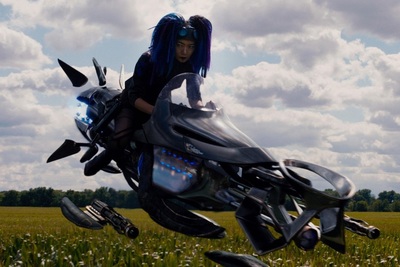Space operas live and die by the amount of information they try and parcel out. Star Wars is a straightforward hero's journey, good versus evil set against a backdrop of hyperdrives and mystical religion. It doesn't explain much, and doesn't need to. Battlestar Galactica muddies the morality of the conflict, but it's still an understandable world that parcels out information at a reasonable pace. The irreverence of Hitchhiker's Guide to the Galaxy puts a darkly comedic spin on the whole genre, where anything can happen and the viewer can accept it or be lost in the shuffle. The Wachowski's Jupiter Ascending wants to find a place in this genre, but it miserably fails by making its world too complicated. The amount of made-up nouns comes at a blinding clip, and by the time the bee-man hybrid shows up, I've completely checked out, leaving me nothing in the tank for the thrilling space bureaucracy montage.

As far as Manichean morality plays go, the harvesting of all life on Earth is as straightforward as it gets. However, the Wachowski's stumble in making this resonant, because there isn't a single likable or interesting person to care about. Kunis and Tatum are both playing everything straight, with no humor or awe or wonder backing up their line readings. In Kunis's case, her character should be the audience surrogate into this world, as her entire sense of herself and humanity's place in the universe has been upended in the course of a few days. However, because so much time is wasted with nonsensical exposition, there's no time for just taking the world in. She adapts remarkably well to suddenly being one of the richest beings in the universe. Though I'm dismissive of it, at least Avatar, another space opera, was able to communicate how mind-bending and unique its world was. The result is a totally bland experience, though all $176 million of the budget is on the screen. All the pretty visuals in the world are not enough when the Wachowski's are incapable of connecting me to the characters.
The villains are more interesting based solely on how strange they're portrayed. Douglas Booth plays the youngest Abrasax, a space playboy given to space orgies, while Tuppence Middleton plays the middle daughter, whose only purpose is exposition. Both are forgettable in the face of Eddie Redmayne, who plays the oldest, Balem. Redmayne inexplicably chooses to mumble and whisper through his line readings, except when he punctuates sentences by SHOUTING AS LOUD AS HE CAN. As an attempt to appear dangerous, it only comes off as laughable. I can't decide if it's a Norbit-level performance that should have ruined his chances at the Oscars or if he saw the ridiculousness of the film he was in and tried to exacerbate it. Balem has a never-ending army of alien grays and lizard beasts and cat-man hybrids behind him, none of which make much of an impression beyond being on the receiving end of his SUDDEN OUTBURSTS.
In addition to the over-the-top or barely-registering characters, the logic of Jupiter Ascending further breaks the film. Caine is repeatedly captured and escapes his braindead jailors in the most obvious way possible. Plot holes are papered over with devices from better movies, lifted wholesale to keep the interminable story moving. A whole system of rules and laws have to be devised so Jupiter won't be killed on sight, and apparently the Wachowski's are the only people in the world who watched the Phantom Menace for the trade disputes. Except there are still instances when assassins are ready to kill her, have her defenseless and alone, and don't kill her, so it's all for nothing. The makeup and costuming are like something out of an 80's sci-fi convention, especially Wachowski favorite Doona Bae, playing a bounty hunter in an inconceivable hairstyle. She's still a human, but they have to make her look insane so we know she's not from Earth. The stealth technology she possesses isn't enough on its own.
Jupiter Ascending is two-plus hours of gibberish and nothing characters attempting to make this huge expenditure not a complete waste of time. There are snippets of interesting ideas, like humanity's place in the universe, genes as destiny, and the most valuable asset of a space-faring civilization being time. However, those ideas are crumbs of meat in between two giant, tasteless slices of CGI Wonder Bread. This sandwich is not worth eating, and the Wachowski's continue a Shyamalan-style descent into absurdity. D-
 RSS Feed
RSS Feed